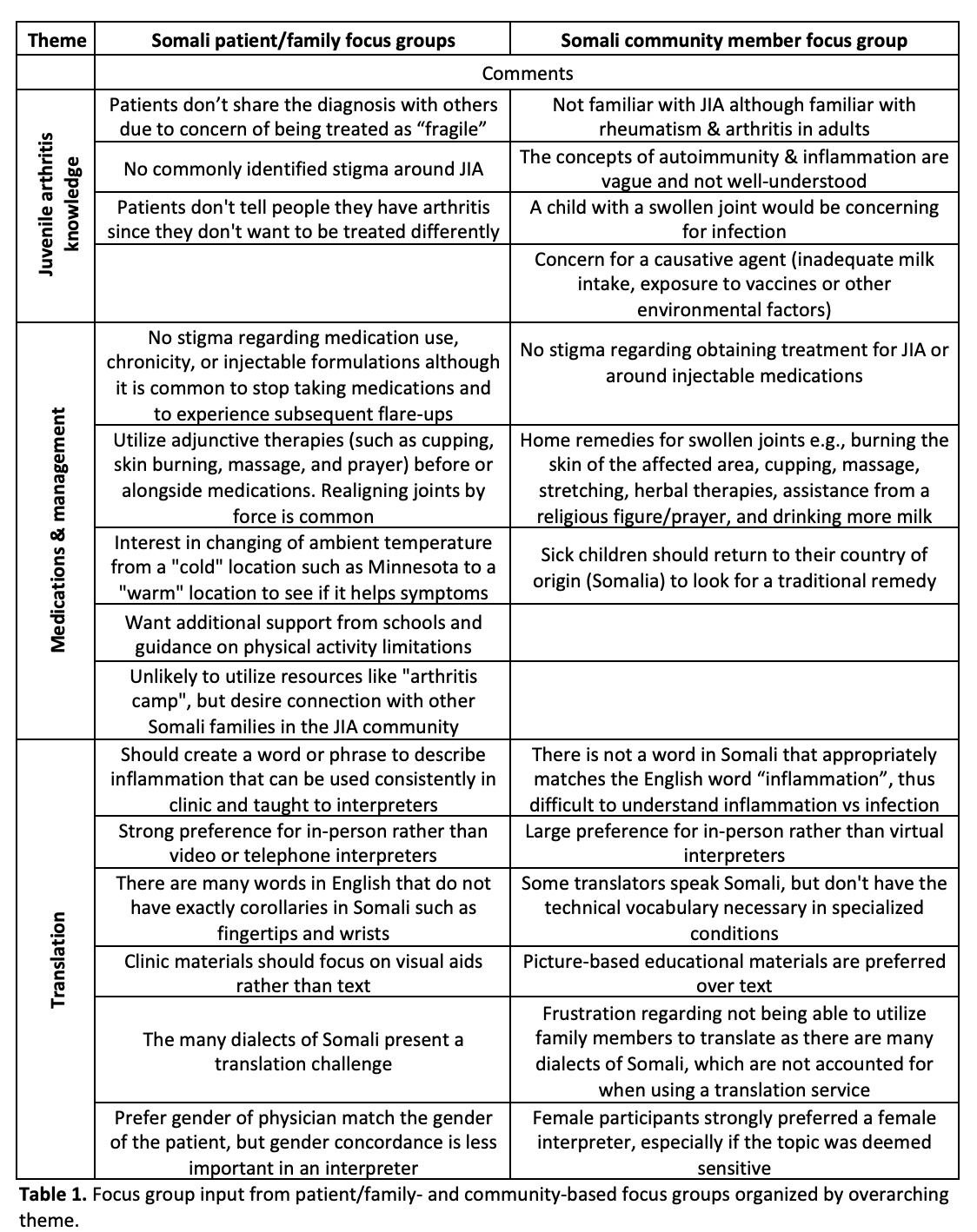Session Information
Date: Thursday, March 30, 2023
Title: Plenary Abstracts Session I
Session Type: Plenary Session
Session Time: 2:30PM-3:30PM
Background/Purpose: Data regarding the linguistic and cultural factors impacting the Somali patient experience and understanding with regards to juvenile idiopathic arthritis (JIA) are limited. We aimed to learn these factors from Somali patients, families, and the community to better inform future practices.
Methods: This cross-sectional, qualitative study abstracted common themes via open-ended questions from 2 Somali focus groups: 1) patients with JIA and their families, and 2) Somali community members.
Somali children with more than one visit to the University of Minnesota pediatric rheumatology clinic from 2020-2022, aged 18 months to 22 years, diagnosed with JIA or uveitis, were identified via Slicer-Dicer searches in the Epic electronic medical record and were recruited. Community members were recruited via mosques, social networks, and word-of-mouth. Focus groups were conducted during the summer at a local community center. Open-ended questions guided focus group discussions that were facilitated by a Somali interpreter. Major themes that resulted from these discussions were recorded.
Results: Patient/family focus groups: Six out of fourteen eligible Somali patients/families attended two group sessions. Participating patients ages were 17, 18, and 19 years old. Participating families included four mothers, one father, and one first-degree relative (cousin). The community-based focus group was comprised of seven women and six men aged >18 years.
In both types of focus groups, three themes emerged: JIA knowledge, medications & management, and translation. Particularly pertinent to the diagnosis of JIA was the realization that there is not a word or corresponding concept for inflammation and autoimmunity. All groups mentioned common home remedies and a desire for adjunctive therapies along with allopathic medications. They noted many linguistic hurdles with interpreters and varying Somali dialects. Specific concepts organized by theme are presented in Table 1.
There was a strong preference for in-person rather than virtual interpreters, a desire for picture-based education materials as opposed to text-based, and a need for a standardized word or phrase that can be used to describe inflammation. There was unanimous support for a proposed educational intervention of a 5-minute video to be shown at the time of JIA diagnosis that introduces important concepts without worrying about variability in translation capability.
Conclusion: This is the first study describing attitudes towards JIA in the Somali population. Data from this study provide valuable insights for pediatric rheumatologists to better understand cultural and linguistic factors impacting the care of Somali youth with JIA, with the potential to improve the delivery of culturally sensitive care to Somali JIA patients through appropriately targeted interventions.
 Table 1. Focus group input from patient/family- and community-based focus groups organized by overarching theme.
Table 1. Focus group input from patient/family- and community-based focus groups organized by overarching theme.
To cite this abstract in AMA style:
Hause E, Ali A, Sunni M. Inflammation or Infection? Understanding Linguistic and Cultural Nuances Impacting the Care of Somali Children with Juvenile Idiopathic Arthritis [abstract]. Arthritis Rheumatol. 2023; 75 (suppl 4). https://acrabstracts.org/abstract/inflammation-or-infection-understanding-linguistic-and-cultural-nuances-impacting-the-care-of-somali-children-with-juvenile-idiopathic-arthritis/. Accessed .« Back to 2023 Pediatric Rheumatology Symposium
ACR Meeting Abstracts - https://acrabstracts.org/abstract/inflammation-or-infection-understanding-linguistic-and-cultural-nuances-impacting-the-care-of-somali-children-with-juvenile-idiopathic-arthritis/
